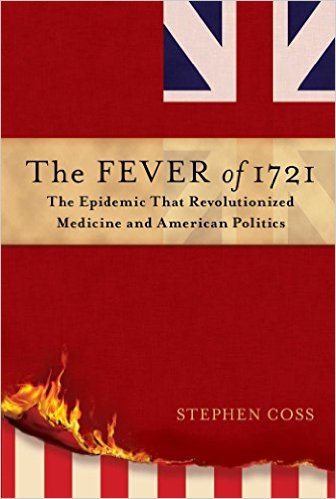The Fever of 1721: The Epidemic That Revolutionized Medicine and American Politics
In The Fever of 1721, author Stephen Coss brings to life the city of Boston Massachusetts in 1721: its political atmosphere, religious leanings and the smallpox epidemic that came crashing onto the scene. When inoculation was put forth as a means to combat the epidemic many feared it would instead spread the disease further. These opinions found voice in a new periodical titled the New-England Courant, published by James Franklin and his soon-to-be famous brother Benjamin.
Coss does a fine job of making the time period and smallpox epidemic come alive, however the backstory of the New-England Courant creates a competing storyline. Though both subjects are interrelated because the Courant took a strong position against inoculation, the plotline veers off in the latter half of the book focusing on James Franklin’s groundbreaking work in disseminating thoughts and philosophies that later helped form the backbone of the American Revolution. This was highly interesting stuff but it did not adhere well to the smallpox issue, making the book seem like it is trying to balance too many ideas. Coss really has two books here and while the epilogue works to tie the two areas together, the book as whole lacks a cohesive structure.
Overall this is a well-researched book chock full of interesting facts, but the divisiveness of the two competing subjects is distracting.
| Author | |
|---|---|
| Star Count | 3/5 |
| Format | Hard |
| Page Count | 368 pages |
| Publisher | Simon & Schuster |
| Publish Date | 08-Mar-2016 |
| ISBN | 9781476783086 |
| Bookshop.org | Buy this Book |
| Issue | May 2016 |
| Category | History |
| Share |







Reviews
There are no reviews yet.